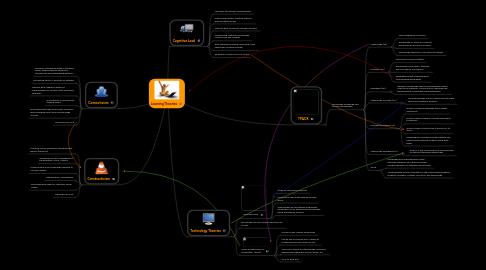
1. Connectivism
1.1. Learning: distributed within a network, social, technologically enhanced, recognizing, and interpreting patterns
1.2. Influencing Factors: diversity of network
1.3. Memory Role: Adaptive patterns, representative of current state, existing in networks
1.4. Transferring: Connecting to (adding notes)
1.5. Best Explained types of learning: Complex, rapid changing core, diverse knowledge sources
1.6. Learning is ACTIVE
2. Constructivism
2.1. Learning: social, meaning created by each learner (personal)
2.2. Influencing Factors: engagement, participation, social, cultural
2.3. Memory Role: Prior knowledge remixed to current context
2.4. Memory Role: Socialization
2.5. Best Explained Types of Learning: social, vague
2.6. learning is ACTIVE
3. Cognitive Load
3.1. Learning: structured, computational
3.2. Influencing Factors: Existing schema, previous experiences
3.3. Memory Role: Encoding, storage, retrieval
3.4. Transferring: duplicate knowledge construct of the "knower
3.5. Best explained learning: reasoning, clear objectives, problem solving
3.6. be aware of HOW MUCH at 1 time
4. Technology Theories
4.1. Media Ecology
4.1.1. study of media environments
4.1.2. technology affects the way we see the world
4.1.3. sees humans as affected by technology rather than SCOT which seems technology being affected by humans
4.2. technology has very strong influences on society
4.3. Social Construction of Technology (SCOT)
4.3.1. Human action shapes technology
4.3.2. can be use to analyze WHY a piece of technology was successful or not
4.3.3. Success or failure of a technology is socially determined regardless of how "good" it is
4.3.4. DVD vs. Blue Ray
5. TPACK
5.1. Technology Pedagogy and Concept Knowledge
5.1.1. Technology (TK)
5.1.1.1. Tech integration in schools
5.1.1.2. Knowledge of HOW to CHANGE the PURPOSE of EXISTING tech
5.1.1.3. Technology enhanced learning environment
5.1.2. Concept (CK)
5.1.2.1. Command of subject matter
5.1.2.2. Knowledge of concepts, theories, and conceptual frameworks
5.1.2.3. knowledge about accepted ways of developing knowledge
5.1.3. Pedagogy (PK)
5.1.3.1. GENERIC knowledge about HOW students LEARN, TEACHING methods, ASSESSMENT methods and KNOWLEDGE of different learning theories
5.1.4. Technology Concept (TC)
5.1.4.1. HOW technology can be used to provide NEW WAYS of teaching CONTENT
5.1.5. Concept Pedagogy (CP)
5.1.5.1. HOW to combine pedagogy and content effectively
5.1.5.2. HOW to make a subject UNDERSTANDABLE to learners
5.1.5.3. WHAT makes a subject EASY/DIFFICULT to learn?
5.1.5.4. knowledge of common misconceptions and likely preconceptions students bring with them
5.1.6. Technology Pedagogy (TP)
5.1.6.1. QUALITY and CONSTRAINTS of technology on different teaching approaches
5.1.7. TPCK
5.1.7.1. knowledge and understanding of the interplay between CK, PK and TK when using technology for teaching and learning
5.1.7.2. Understanding of the complexity of the relationships between students, teachers, content, practices, and technology
